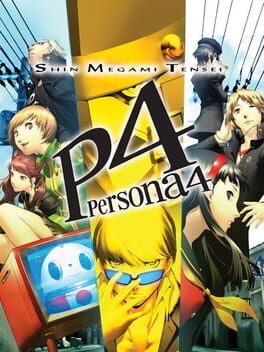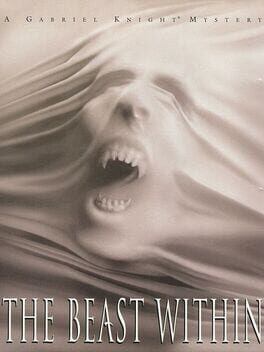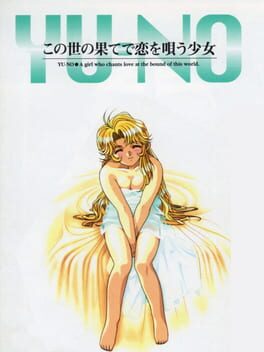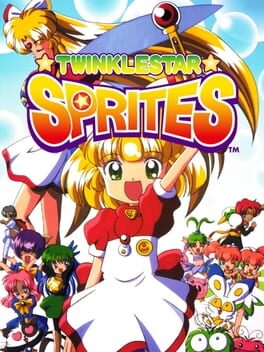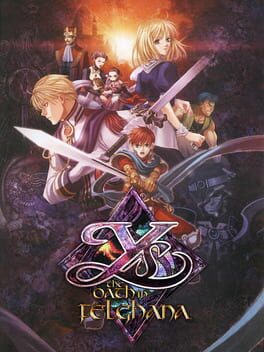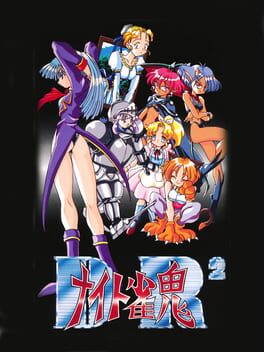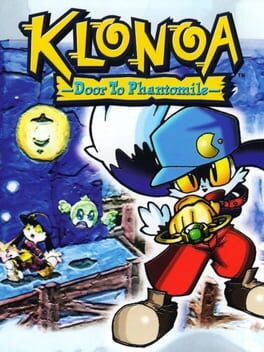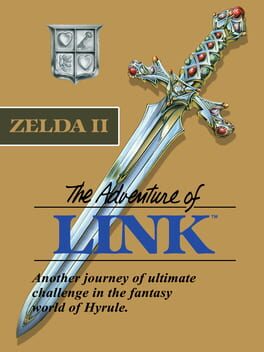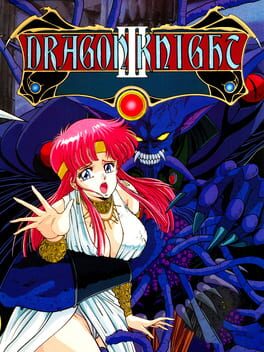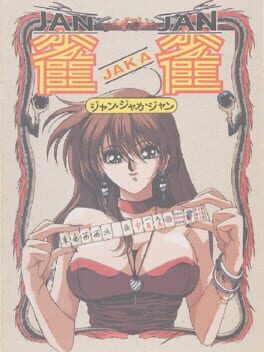Neverwhere
Bio
Nothing here!
Badges

Loved
Gained 100+ total review likes

Organized
Created a list folder with 5+ lists

Noticed
Gained 3+ followers

Roadtrip
Voted for at least 3 features on the roadmap

Liked
Gained 10+ total review likes

3 Years of Service
Being part of the Backloggd community for 3 years

On Schedule
Journaled games once a day for a week straight
Favorite Games
065
Total Games Played
000
Played in 2024
000
Games Backloggd
Recently Played See More
Recently Reviewed See More
I'm continuing to dive into the obscure world of PC-98 mahjong games with this DR2 (dora dora, I guess?) Night Janki.
This is a honestly a game more interesting for its history than for what it actually is. It's the first game created by Leaf, eroge branch of game publisher Aquaplus. This company was originally established as U-Office in 1994 by former TGL composer Naoya Shimokawa, with the help of another TGL colleague, Shinji Orito. Their goal was focused on music, but they quickly shifted to making games.
Well, turns out making games is hard, and DR2 Night Janki was forgotten for a reason.
This is your standard 1-on-1 strip mahjong soft. At the start, you're presented with two modes: AVG (adventure game) mode, which is the standard story mode, and practice mode, where you can play against the various girls as much as you want (if you want to train your mahjong skills against a cheating AI, here's your chance).
The story of the game is paper-thin, even for the genre. You play as a detective named Ryuuji known for his psychic abilities and outrageous riichi mahjong skills (what a resume). He receives one day an invitation to an ancient mansion. He's not the first one to get one, but everyone before him who went there never came back (not a good sign, I'd say). Obviously our protagonist is made of different stuff and is up and ready to solve the mansion's mystery. To get to the heart of things, he'll have to fend off a number of demon girls inhabiting the place by defeating them in a deadly match of strip mahjong. Yeah, really.
The game is divided in two phases: adventure and mahjong. In the adventure part you move in the mansion by selecting each room on a map. You can also search a room and,... That's it. Your goal is to find and fight every girl to get to the end. Since there are only 7 girls for 6 mahjong battles (the devil girls Ivil and Evil are staying together), it feels pretty short. There's also a shop where you can buy healing and cheat items.
The mahjong part is competent. There's no popup to indicate if you can riichi or steal tiles (you need to open the menu), but otherwise it's not different from your modern mahjong video game interpretation. It's when you win that you'll see the true weirdness (and deviousness) of DR2NJ. You're presented with a simple choice: taking heath from your opponent, or turning points into money. Winning three hands is enough to defeat most girls (except for the much tougher final boss), but if you neglect to get money, you'll quickly regret it since it's the only way you can get items or even heal! You have a health bar, and it will decrease depending on how much "damage" (points) you get hit with. It means that small hands will remove half a heart, but a yakuman can outright one-shot you (just great). You don't get any health back between battles so you will absolutely want that money, but on the other hand trying to "milk" the enemy can be a recipe for disaster. My advice is to keep the money when you win really big hands, and deal damage with small one. It's a neat risk/reward system on paper, but it can be infuriating in practice and up the difficulty significantly.
DR2NJ is full of that kind of strange game design making the game feel amateurish. You can get super special skills to help you, but to learn them, you've got to check empty rooms several times without any hint. Those skills are not even that helpful considering they take a whole heart to use (your default health is only three hearts)!
There are three endings to the game, and every time you need to defeat the very difficult final boss. Since they all kinda suck, just go for the true end... Except, here come the twist, the true end is gated behind a number puzzle. Why? Why would you do this? Is this a mahjong game or fucking Layton? Just baffling stuff.
DR2 Night Janki is a late-era PC-98, and it looks as good as expected. I always felt than the cute character art in Leaf games didn't fit the erotic and sometimes violent content very well, but beyond that I've got no real issue. The highlight would be the music. You can even choose between a FM, MIDI, or CD soundtrack depending on your setup.
This is competent enough to not be considered kusoge, but it's clearly not a game worth playing even if you're a mahjong or Leaf fan.
This is a honestly a game more interesting for its history than for what it actually is. It's the first game created by Leaf, eroge branch of game publisher Aquaplus. This company was originally established as U-Office in 1994 by former TGL composer Naoya Shimokawa, with the help of another TGL colleague, Shinji Orito. Their goal was focused on music, but they quickly shifted to making games.
Well, turns out making games is hard, and DR2 Night Janki was forgotten for a reason.
This is your standard 1-on-1 strip mahjong soft. At the start, you're presented with two modes: AVG (adventure game) mode, which is the standard story mode, and practice mode, where you can play against the various girls as much as you want (if you want to train your mahjong skills against a cheating AI, here's your chance).
The story of the game is paper-thin, even for the genre. You play as a detective named Ryuuji known for his psychic abilities and outrageous riichi mahjong skills (what a resume). He receives one day an invitation to an ancient mansion. He's not the first one to get one, but everyone before him who went there never came back (not a good sign, I'd say). Obviously our protagonist is made of different stuff and is up and ready to solve the mansion's mystery. To get to the heart of things, he'll have to fend off a number of demon girls inhabiting the place by defeating them in a deadly match of strip mahjong. Yeah, really.
The game is divided in two phases: adventure and mahjong. In the adventure part you move in the mansion by selecting each room on a map. You can also search a room and,... That's it. Your goal is to find and fight every girl to get to the end. Since there are only 7 girls for 6 mahjong battles (the devil girls Ivil and Evil are staying together), it feels pretty short. There's also a shop where you can buy healing and cheat items.
The mahjong part is competent. There's no popup to indicate if you can riichi or steal tiles (you need to open the menu), but otherwise it's not different from your modern mahjong video game interpretation. It's when you win that you'll see the true weirdness (and deviousness) of DR2NJ. You're presented with a simple choice: taking heath from your opponent, or turning points into money. Winning three hands is enough to defeat most girls (except for the much tougher final boss), but if you neglect to get money, you'll quickly regret it since it's the only way you can get items or even heal! You have a health bar, and it will decrease depending on how much "damage" (points) you get hit with. It means that small hands will remove half a heart, but a yakuman can outright one-shot you (just great). You don't get any health back between battles so you will absolutely want that money, but on the other hand trying to "milk" the enemy can be a recipe for disaster. My advice is to keep the money when you win really big hands, and deal damage with small one. It's a neat risk/reward system on paper, but it can be infuriating in practice and up the difficulty significantly.
DR2NJ is full of that kind of strange game design making the game feel amateurish. You can get super special skills to help you, but to learn them, you've got to check empty rooms several times without any hint. Those skills are not even that helpful considering they take a whole heart to use (your default health is only three hearts)!
There are three endings to the game, and every time you need to defeat the very difficult final boss. Since they all kinda suck, just go for the true end... Except, here come the twist, the true end is gated behind a number puzzle. Why? Why would you do this? Is this a mahjong game or fucking Layton? Just baffling stuff.
DR2 Night Janki is a late-era PC-98, and it looks as good as expected. I always felt than the cute character art in Leaf games didn't fit the erotic and sometimes violent content very well, but beyond that I've got no real issue. The highlight would be the music. You can even choose between a FM, MIDI, or CD soundtrack depending on your setup.
This is competent enough to not be considered kusoge, but it's clearly not a game worth playing even if you're a mahjong or Leaf fan.
This collection repackages nine small Flash escape games in a single one. While "Flash escape game" makes it sounds like a bunch of casual time-wasters, those are actually pretty decent point & click with multiple puzzles and even NPCs and contraptions to use. The quality of the games and puzzles can vary wildly (from genuine brain ticklers to sliding puzzle crap and moon logic), but they're mostly a very good time.
Another good point is the surrealistic setting, very much inspired by Twin Peaks. A bit too much even, since the story beginning with the death of a woman named Laura feels already too on the nose, but the detective named Dale? Come on.
It also makes a very liberal use of jump scares and grotesque violence, which won't be everyone's cup of tea (I personally thought it was in pretty poor taste).
At least those bird men are cool though.
Let's look at the games individually:
- Seasons: a good start to the series with a neat narrative and mechanical twist near the end.
- The Lake: extremely short and simple. Doesn't do much beyond its weird focus on fishing.
- Arles: a pretty good van Gogh-themed game. It doesn't fit well with the rest of the Rusty Lake story, but I enjoyed it a lot.
- Harvey's Box: a very literal take on the puzzle box theme. Sadly it doesn't do much beyond that, and the quality of the actual puzzles is nothing to write home about. My least favorite entry.
- Case 23: now this is the most ambitious game in the collection. It's longer, has multiple rooms and numerous puzzles, and tries to develop the story with the introduction of the detective protagonist Dale Vandermeer. Quality is sadly a little inconsistent though (I mean, this is the one with a sliding puzzle).
- The Mill: we're getting closer and closer to a "regular" point-and-click game here. You can move around and check inside every room in the titular mill (well, there are only three), and there's even a NPC you need to feed for some reason (I actually got stuck a while because of that). Not bad.
- Birthday: this one is more straightforward but has pretty interesting puzzles and a fun setting. Not fan of the random violence though.
- Theatre: very similar to Birthday with once again nice puzzles, a cool setting and very well-paced. One of my favorite despite the weird gore (but if it was your dream to literally dive inside one man's brain, here you go).
- The Cave: the last game of the collection. Pretty clearly divided in two parts: the first is a classic escape room in a rather drab-looking cave with puzzles of various quality (mostly on the mediocre/forgettable side), the second is spent under water inside a submarine. You need to move the small vessel manually by finding coordinates, using various control panels and solving simple puzzles along the way. I found it a nice change of pace, but I can see other players hating it since it's very repetitive.
Overall a decent collection of games, especially at a low price.
Another good point is the surrealistic setting, very much inspired by Twin Peaks. A bit too much even, since the story beginning with the death of a woman named Laura feels already too on the nose, but the detective named Dale? Come on.
It also makes a very liberal use of jump scares and grotesque violence, which won't be everyone's cup of tea (I personally thought it was in pretty poor taste).
At least those bird men are cool though.
Let's look at the games individually:
- Seasons: a good start to the series with a neat narrative and mechanical twist near the end.
- The Lake: extremely short and simple. Doesn't do much beyond its weird focus on fishing.
- Arles: a pretty good van Gogh-themed game. It doesn't fit well with the rest of the Rusty Lake story, but I enjoyed it a lot.
- Harvey's Box: a very literal take on the puzzle box theme. Sadly it doesn't do much beyond that, and the quality of the actual puzzles is nothing to write home about. My least favorite entry.
- Case 23: now this is the most ambitious game in the collection. It's longer, has multiple rooms and numerous puzzles, and tries to develop the story with the introduction of the detective protagonist Dale Vandermeer. Quality is sadly a little inconsistent though (I mean, this is the one with a sliding puzzle).
- The Mill: we're getting closer and closer to a "regular" point-and-click game here. You can move around and check inside every room in the titular mill (well, there are only three), and there's even a NPC you need to feed for some reason (I actually got stuck a while because of that). Not bad.
- Birthday: this one is more straightforward but has pretty interesting puzzles and a fun setting. Not fan of the random violence though.
- Theatre: very similar to Birthday with once again nice puzzles, a cool setting and very well-paced. One of my favorite despite the weird gore (but if it was your dream to literally dive inside one man's brain, here you go).
- The Cave: the last game of the collection. Pretty clearly divided in two parts: the first is a classic escape room in a rather drab-looking cave with puzzles of various quality (mostly on the mediocre/forgettable side), the second is spent under water inside a submarine. You need to move the small vessel manually by finding coordinates, using various control panels and solving simple puzzles along the way. I found it a nice change of pace, but I can see other players hating it since it's very repetitive.
Overall a decent collection of games, especially at a low price.
Well before their Elf All Stars Datsui Jan series, Elf released this mahjong game in the early 90s'. Developed during their RPG period and just before Doukyuusei, it has that distinct early PC-98 style that will immediately appeal to some people. Beyond that, it's a pretty basic game.
You play as a "professional" mahjong player. A sketchy job for a sketchy character since he starts the story pursued by the yakuza. Running away, he bumps into a poor office lady and to trick his pursuers, he kisses her to make them look like an unrelated couple. The girl obviously complains and gets caught by the two idiotic yakuza dudes who think she's his girlfriend. Meanwhile, our "hero" runs away and leaves town.
He comes back two years later, up to his usual shenanigans. The main character quickly learns of a new mahjong "dojo" that opened during his absence: a strip mahjong establishment where you pay a pretty substantial sum of money to get the chance of stripping down young women (and maybe more).
That's it, that's the story.
There are at least two issues you can see from the summary alone: first, the "plot" by itself is pretty dire; secondly, the main character is a completely idiotic asshat with no redeeming qualities whatsoever beyond knowing how to play mahjong.
Gameplay is more complex than your usual strip mahjong video game. You move your character on a small city map, reminding of the one in Doukyuusei in a much smaller scale. On that map, you can access various mahjong parlors, shops and hotels to replenish your health. Because, yes, you've got a health gauge, and also a "spirit" gauge. It looks a bit like a RPG at first, but the game system is actually very simple.
The main interest of Jan Jaka Jan is the actual mahjong. You have two types: one-on-one duel like in most strip mahjong games, and traditional 4 players game (it's a Japanese game, so it's all Japanese riichi mahjong, of course). The mahjong dojo duels have a special rule where you start at zero point and risk going home at the first defeat, but on the other hand, you only need to win three times to beat the girl. Mahjong gameplay is unsurprising. Sadly I found the difficulty very uneven and RNG-dependant, even for a luck game. You either roll over the opponents, or you get rolled yourself. Tense battles where every hand is important are rare, you're better off reloading the game until luck is on your side to win. Another issue is the "spirit" gauge mechanic: when you get hit directly (ron or tsumo, doesn't matter), you lose willpower. And the less willpower you have, the worst starting hands you get. So it can basically start a losing spiral (fun!). At least you can use items to heal (and there's also cheat items if that's your thing).
One final word (warning) on the mahjong: it's not a game for beginners. The reason is that the game will let you chombo. Press riichi by mistake? Be ready to eat a 8000 points penalty! If you don't know when to open your hand, or how furiten works, then don't bother with this game at all.
The general flow of the game is making money at the various parlors in town, then using this money to heal and to challenge the girls, repeat until you've beaten everyone. It's very simple and grindy. There's also story events along the way (you get your money stolen three times during the story, by the way) (yeah, more grind). Well, I guess, the main point is the mahjong anyway.
If you want to point a good reason to play this game, it's the beautiful art (I especially like the character designs of the four parlors owners). It also has a funny (but obvious) plot twist at the end (don't get me wrong, the story is still crap).
Overall, it's a barely above-average mahjong game.
You play as a "professional" mahjong player. A sketchy job for a sketchy character since he starts the story pursued by the yakuza. Running away, he bumps into a poor office lady and to trick his pursuers, he kisses her to make them look like an unrelated couple. The girl obviously complains and gets caught by the two idiotic yakuza dudes who think she's his girlfriend. Meanwhile, our "hero" runs away and leaves town.
He comes back two years later, up to his usual shenanigans. The main character quickly learns of a new mahjong "dojo" that opened during his absence: a strip mahjong establishment where you pay a pretty substantial sum of money to get the chance of stripping down young women (and maybe more).
That's it, that's the story.
There are at least two issues you can see from the summary alone: first, the "plot" by itself is pretty dire; secondly, the main character is a completely idiotic asshat with no redeeming qualities whatsoever beyond knowing how to play mahjong.
Gameplay is more complex than your usual strip mahjong video game. You move your character on a small city map, reminding of the one in Doukyuusei in a much smaller scale. On that map, you can access various mahjong parlors, shops and hotels to replenish your health. Because, yes, you've got a health gauge, and also a "spirit" gauge. It looks a bit like a RPG at first, but the game system is actually very simple.
The main interest of Jan Jaka Jan is the actual mahjong. You have two types: one-on-one duel like in most strip mahjong games, and traditional 4 players game (it's a Japanese game, so it's all Japanese riichi mahjong, of course). The mahjong dojo duels have a special rule where you start at zero point and risk going home at the first defeat, but on the other hand, you only need to win three times to beat the girl. Mahjong gameplay is unsurprising. Sadly I found the difficulty very uneven and RNG-dependant, even for a luck game. You either roll over the opponents, or you get rolled yourself. Tense battles where every hand is important are rare, you're better off reloading the game until luck is on your side to win. Another issue is the "spirit" gauge mechanic: when you get hit directly (ron or tsumo, doesn't matter), you lose willpower. And the less willpower you have, the worst starting hands you get. So it can basically start a losing spiral (fun!). At least you can use items to heal (and there's also cheat items if that's your thing).
One final word (warning) on the mahjong: it's not a game for beginners. The reason is that the game will let you chombo. Press riichi by mistake? Be ready to eat a 8000 points penalty! If you don't know when to open your hand, or how furiten works, then don't bother with this game at all.
The general flow of the game is making money at the various parlors in town, then using this money to heal and to challenge the girls, repeat until you've beaten everyone. It's very simple and grindy. There's also story events along the way (you get your money stolen three times during the story, by the way) (yeah, more grind). Well, I guess, the main point is the mahjong anyway.
If you want to point a good reason to play this game, it's the beautiful art (I especially like the character designs of the four parlors owners). It also has a funny (but obvious) plot twist at the end (don't get me wrong, the story is still crap).
Overall, it's a barely above-average mahjong game.
